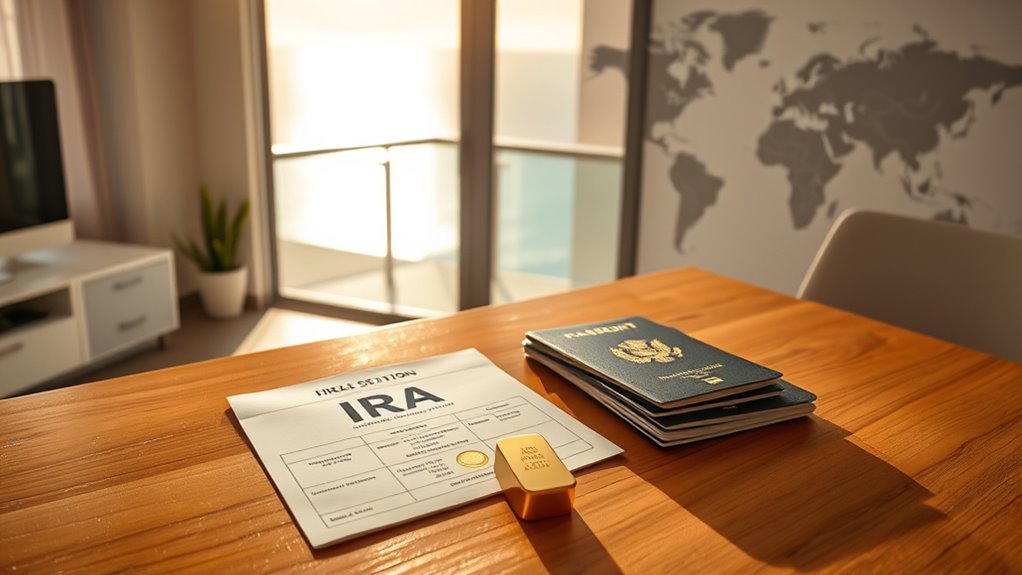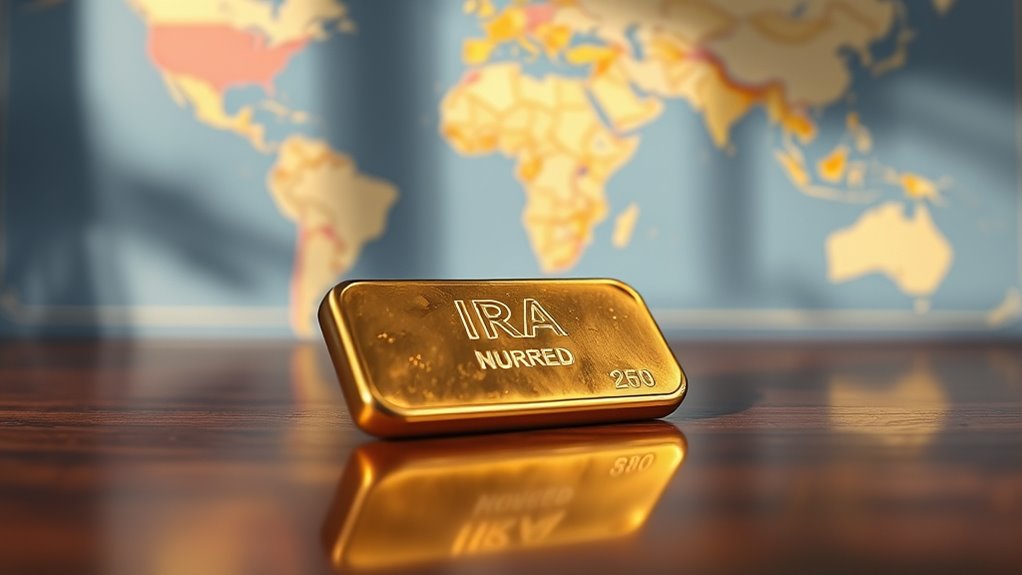When you move abroad, your Gold IRA stays in U.S.-approved custodial storage, and your ownership remains intact under IRS rules. You’ll need to inform your custodian of your new address or residency to stay compliant. Managing your account from abroad involves coordinating with your custodian for transactions or transfers, all without physically handling the gold. To guarantee everything stays in order, there are key requirements you should understand—more details await if you explore further.

Moving abroad doesn’t mean you have to relinquish your Gold IRA. Your account remains intact, and your gold stays in approved depositories, usually managed by U.S.-based custodians. These custodians are regulated under IRS rules, ensuring your assets are protected and compliant. The key is maintaining communication; you need to inform your custodian of any change in address or residency so they can update their records and handle correspondence properly. Remember, even if you move overseas, you don’t get physical possession of the gold. It stays in secure vaults, with the custodian or approved storage facilities. As the account holder, you’re not permitted to take physical control of the metals, which helps avoid legal or tax issues. U.S. regulations require that custodians maintain control over the physical assets at all times. Your move abroad doesn’t alter the U.S. tax rules that apply to your Gold IRA. Distributions, rollovers, and transfers follow the same regulations regardless of where you live. If you take a distribution before age 59.5, you risk a 10% early withdrawal penalty, along with ordinary income tax, unless you qualify for an exception. Rollovers have a strict 60-day window to deposit funds into a new IRA, or you’ll face taxes and penalties. Transfers, however, are different; they involve a direct custodian-to-custodian move, which doesn’t trigger tax implications or withholding. You can manage these transfers from abroad by coordinating with your custodians and submitting the necessary paperwork. While it’s technically possible to transfer your IRA assets internationally, holding a Gold IRA in an offshore storage facility is generally discouraged. Countries like Switzerland and Singapore are popular for offshore precious metals storage, but they’re rarely linked to U.S. IRAs due to complex regulations. The IRS requires metals to remain in approved vaults within the U.S., and physical possession outside U.S. vaults isn’t permitted. Holding metals offshore can complicate compliance and increase scrutiny, so it’s best to keep your metals in IRS-approved locations. Selling gold assets within your IRA, whether ETFs or physical gold, is handled through your custodian and doesn’t involve taking physical possession, even if you’re living abroad. U.S. citizens or residents abroad must continue to adhere to IRS reporting requirements for IRAs. This includes annual filings for contributions and distributions, and reporting foreign income if applicable. While tax treaties with your new country might affect some tax obligations, they do not eliminate your U.S. tax responsibilities on your Gold IRA. Staying compliant ensures your retirement savings remain protected, no matter where in the world you reside. Additionally, understanding IRA regulations is crucial for avoiding unintended penalties or compliance issues when managing your account from abroad.
Frequently Asked Questions
Can I Keep My Gold IRA if I Change Countries?
You can keep your Gold IRA if you change countries, but you’ll need to stay with a U.S.-based custodian. Moving the IRA itself offshore isn’t allowed under IRS rules, but you can continue managing it from abroad, as long as you notify your custodian of your new address. Remember, physical gold remains in approved depositories, and you’ll still follow U.S. tax laws and reporting requirements.
Are There Tax Implications When Moving Abroad With a Gold IRA?
Imagine a ship sailing across international waters—that’s similar to moving your Gold IRA abroad. When you relocate, you still owe U.S. taxes on distributions, even if you’re overseas. You must report withdrawals, and foreign tax treaties might help prevent double taxation. Proper planning guarantees your IRA remains tax-advantaged, but it’s wise to consult experts to navigate complex rules, maximize benefits, and avoid unexpected tax surprises.
How Do I Access My Gold IRA Assets Internationally?
When you want to access your Gold IRA assets internationally, you typically need to contact your custodian for instructions. They can help you sell the gold or arrange for distribution, often providing options for international clients. Keep in mind, withdrawing assets might trigger U.S. tax penalties if not handled correctly. It’s essential to follow proper procedures and stay compliant with both U.S. and foreign regulations.
Is It Legal to Hold a Gold IRA in My New Country?
You wonder if holding a Gold IRA in your new country is legal. It depends on the local laws and whether the country permits importing and storing U.S.-owned IRA metals. You need to verify the foreign jurisdiction recognizes and complies with IRS requirements, using approved custodians and vaults. Failing to follow these rules can lead to penalties, tax issues, or even disqualification of your IRA, so do thorough research before proceeding.
What Are the Reporting Requirements for a Gold IRA Abroad?
Ever wonder how your gold IRA stays compliant abroad? You need to report profits on your U.S. tax returns, regardless of where you live. Foreign accounts over certain thresholds require FBAR and Form 8938 filings. Physical gold held directly isn’t usually reported, but related financial instruments might be. Selling gold triggers dealer reporting, and ignoring these rules can lead to hefty penalties. Stay informed to keep your gold IRA compliant globally.
Conclusion
Moving abroad doesn’t have to mean losing your Gold IRA. With proper planning and understanding of international regulations, you can keep your investments secure and accessible. Did you know that over 60% of expats keep some form of precious metals as part of their financial strategy? So, whether you’re relocating for work or adventure, your gold can stay a valuable part of your portfolio—just make sure to stay informed and work with experts to navigate the process smoothly.









